Study Dead Poets Society if you want to avoid the Top 7 Deadly Mistakes of a Bad Screenplay, and get your screenplay read, not tossed.
We "dissected" this movie script in terms of story, character, conflict, dialogue, format and structure.
Just follow our in-depth analysis and apply our findings to your own screenplay. You'll get the opportunity to acknowledge what works and fix what doesn't.
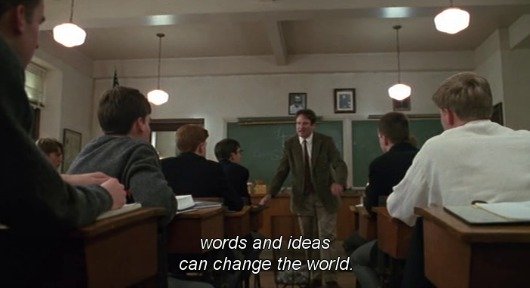
Inside of our series "Learn From The Masters" we chose to review the screenplay Dead Poets Society as its story is very inspirational for all of us screenwriters.
It's about finding one's voice, one's self expression and be true to it.
We dissected the screenplay of Tom Schulman to access its "source code", and each of us reviewed it from his area of expertise.
Dr Read lays out the story;
Cool Dude talks about the characters;
Dr Read dismantles the various conflicts;
Blablator reviews the dialogue and dialogue techniques;
Formatman picks up some interesting elements of screenplay formatting; and
Structor reveals the main structure points.
Dr. Read:
Dead Poets Society is the story of 7 young men, Neil Perry, Todd Anderson, Richard Cameron, Knox Overstreet, Charlie Dalton, Steven Meeks and Gerard Pitts who study at the very renowned, strict and conventional Welton Academy.
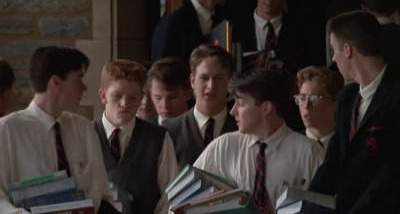
Their life is molded by the four pillars of the school: "Tradition, Honor, Discipline, Excellence". And everything is done to ensure they will walk in the footsteps of their parents and become bankers, doctors and lawyers.

Everything seems to work according to plan until they meet their new and very unconventional English teacher, John Keating. 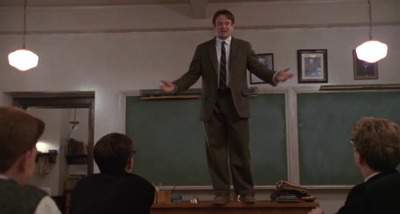
They will learn from him "free thinking" and the pleasure to "seize the day", which will completely alter the course of their lives.
This transformation is well illustrated by 2 pictures:
1.at the beginning of the screenplay: a world of tradition and obedience 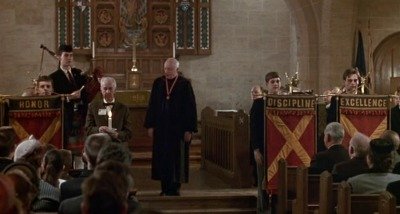 2.at the end: a world of free thinking and leadership
2.at the end: a world of free thinking and leadership 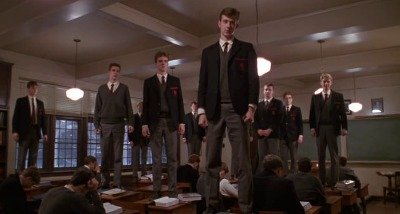
Dead Poets Society contains many remarkable scenes, like:
-- Carpe diem (seize the day)
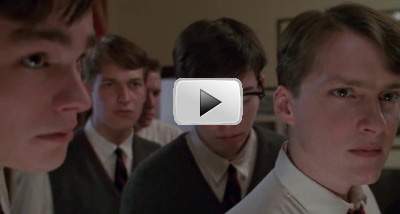
-- Rit it out

-- What will your verse be?
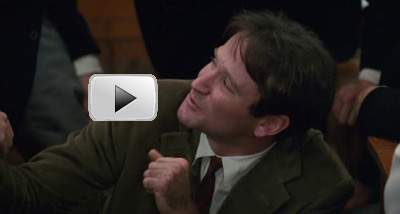
-- Barbaric Yawp
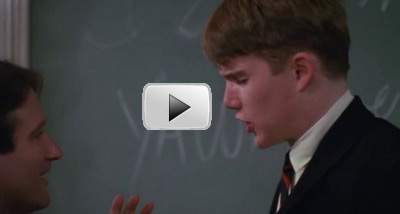
-- Call from God
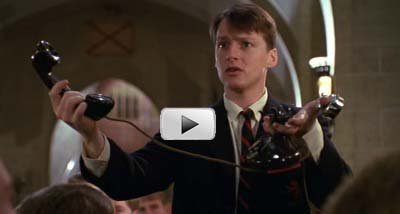
-- And the last scene: O Captain, my captain
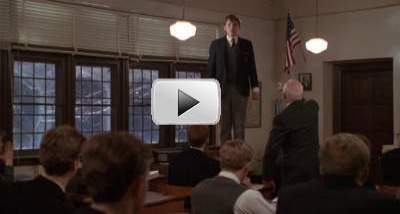
It is also a very inspiring story about a group of young men discovering what's possible when they go out of the conformity path and strive to find their own voice.
Dead Poets Society has definitely the "What a script!" factor as this is what you say to yourself when you read the last lines of the screenplay.
It is therefore no surprise that it won the Oscar for best screenplay and got nominated at the Golden Globes and BAFTA awards.
Let's start with the characters.
Cool Dude:
Neil Perry and Mr Keating are the main characters of Dead Poets Society.
The way they are both introduced in the screenplay reveal immediately the different worlds they live in.
A world of "constraints and expectations for Neil:
And a world of freedom and creativity for Mr Keating:MR NOLAN Neil. We expect great things from you this year. NEIL Thank you, sir. MR PERRY Well he won't disappoint us. Right Neil? NEIL I'll do my best sir.
The students quickly quiet down as Keating emerges from the other room, whistling the 1812 Overture. He walks up the length of the classroom and out the door without a word. The students look around at one another, uncertain of what to do. Keating pokes his head back in the doorway. KEATING Well come on.
Check our 10 tips to create the "right" name for your character. It is part of 11 steps to create a compelling character.
So what's in Neil's name?
The name of Neil is Irish and means "champion" and "passionate".
And this fits well with who Neil becomes when exposed to Mr Keating's influence: he reconvenes the Dead Poets Society, dedicated to sucking the marrow out of life, and discovers his passion for acting. 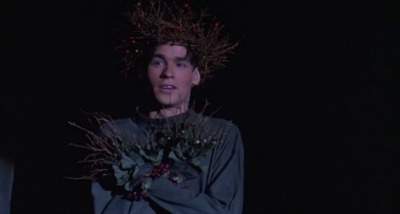
The first name of Mr Keating is John, which stands for "God is gracious", and there is effectively a lot of grace in how Mr Keating transforms the life of the young men in Dead Poets Society. And for them, he occurs as a gift of God, opening the possibility of taking the road less traveled by.
What about his family name?
Well, there was a John who played an important role in the conquest of the kingdom of Ireland. He was surnamed by the Irish Keith-teine, a shower of fire, from the fierceness of his attacks on them.
This would fit well the character of Mr Keating in the screenplay of Tom Schulman because he is relentless about free thinking and finding one's own voice.
In the course of the story he takes control of his own life, and follows his aspirations.
His way of being illustrates this transformation.
Neil starts as a constrained young man and becomes fully self expressed when presiding over the sessions of the Dead Poets Society and playing the role of Puck on stage in A Midsummer Night's Dream.
Neil does not have a breakthrough though in his relationship with his father. The only difference - and it an essential one - is how he deals with it.
At the beginning of the story, Neil surrenders to his father's decisions about his life.
At the end of the story, Neil does not. He prefers taking his life than following a road which is not his.
This opposition with his father brings us to the notion of conflict, BAM!?
BAM!:
There are 2 scenes in particular in Dead Poets Society which show this point of friction.
They both involve Neil Perry and his father.
And both have in common that the Neil's "voice" - his vocal cords on one side and his artistic talent on the other side - gets shut down by his father.
In both cases, Neil shuts up and gives up doing what he loves to do.
What makes these scenes of Dead Poets Society remarkable is that they ring true.
Neil's father uses domination, manipulation, authority and even flattery to win his argument with his son. And Neil starts by standing for himself but does not follow through.
All is in the subtext - especially in the second scene.
It makes the conflict even bigger and leaves the reader with an experience of injustice, "life being unfair" to Neil, the hero.
The first scene happens at the very start of the story: Neil's father come and visit Neil in his room at the dorm:
The door opens and Mr. Perry walks into the room. Neil quickly rises from the window. NEIL Father, I thought you'd gone. The other boys stand up when he enters. BOYS Mr. Perry. MR PERRY Keep your seats fellows, keep your seats. Neil, I've just spoken to Mr. Nolan. I think that you're taking too many extra curricular activities this semester, and I've decided that you should drop the school annual. NEIL But I'm the assistant editor this year. MR PERRY Well I'm sorry Neil. NEIL But Father, I can't. It wouldn't be fair. MR PERRY Fellas, would you excuse us for a moment? Mr. Perry walks towards the door and Neil hesitantly follows. Mr. Perry pauses by the door and smiles to the other boys. INT. HALLWAY - DAY The smile has gone from Mr. Perry's face. He grabs a hold of Neil's arm. MR PERRY Don't you ever dispute me in public. Do you understand?NEIL Father, I wasn't disputing- MR PERRY After you've finished medical school and you're on your own, then you can do as you damn well please. But until then, you do as I tell you. Is that clear? NEIL Yes sir. I'm sorry. MR PERRY You know how much this means to your mother, don't you? NEIL Yes sir. You know me, always taking on too much. MR PERRY Well, that's my boy. Now listen, you need anything, you let us know, huh? NEIL Yes sir.
The second scene happens at the end of Dead Poets Society and echoes with the first one.
Neil just delivered the performance of his life on stage as Puck in A Midsummer Night's Dream and is back home.
His father is furious as Neil disobeyed his orders to drop out from the play. He has decided to withdraw Neil from Welton Academy and enroll him in a Military school.
This is the climax, the final attempt of Neil to be heard by his father, in front of his mother, who basically doesn't say anything.
There is again an economy of words, everything is in the subtext. 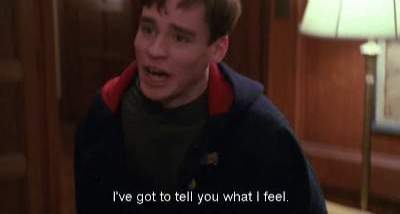
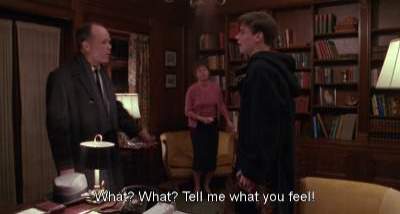
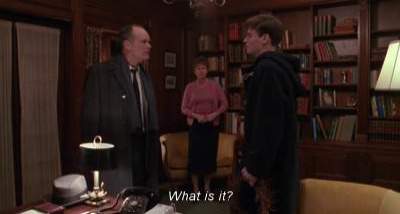
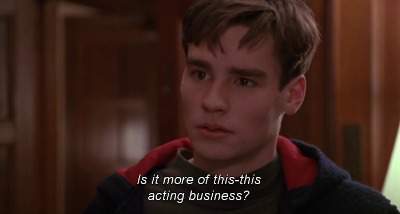
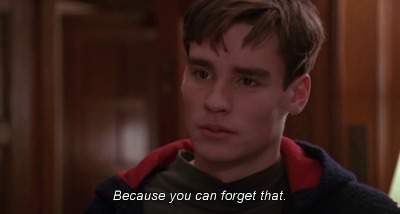
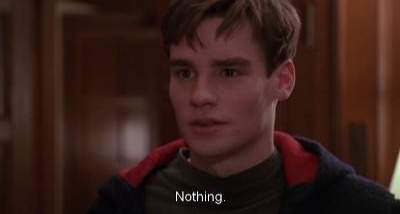
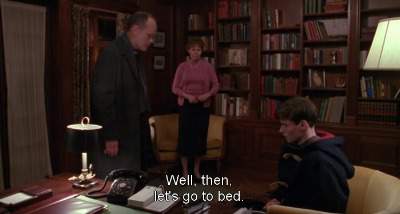
Neil's despair is palpable. He's broken - and so is his dream.
Above exchange is also the last one between Neil and his father.
A few hours later Neil will commit suicide.
This is his answer to Keating's question: "what will your verse be?"
He prefers to die as an artist, rather than living a life which is not his.
Blablator:
First, the dialogue of Dead Poets Society is brilliant.
It fulfills every time one or more of the 5 movie dialogue functions.
And you get to experience various emotions. There are scenes which leave you laughing. Others have you be inspired, frustrated or even sad.
There are various dialogue techniques used in Dead Poets Society.
Let's mention 3 of them:
Sean Maguire, from the screenplay Good Will Hunting, explains in detail how this dialogue technique works in this article titled "It's not your fault".
There is a skilfull application of this dialogue technique in the Dead Poets Society death scene, when Neil's parents discover their son's body inert on the floor.
The repetition shows the state of incomprehension of the father, the complete denial of the mother and finally the necessity of the father to intervene and stop his wife's talking.
MR. PERRY My son! My poor son! MRS. PERRY (crying hysterically) He's all right! He's all right! He's all right! He's all right! He's all right! He's all right! MR. PERRY Stop it! Stop it! Stop it.
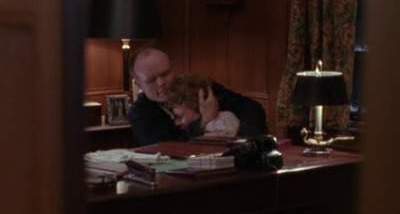
The second dialogue technique is called formal.
Characters who are uptight have a tendency to use "sophisticated" words and show an absence of emotion.
This formal way of speaking creates both a distance with the other characters, and a contrast with how the other characters express themselves.
In this example of Dead Poets Society the teacher McAllister combines both the "repetition" and "formal" dialogue techniques:
INT. STAIRCASE - DAY The sound of squawking birds merges into the sound of noisy boys as they descend the stairs in a long spiralling line. MR. MCALLISTER tries to make it upstairs against the steady stream. MCALLISTER Slow down boys, slow down you horrible phalanx of pubescense.
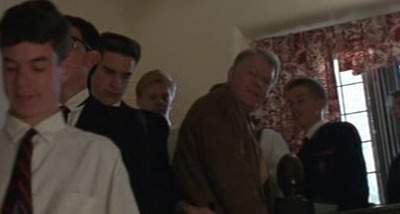 See how it contrasts with how the boys speak with each other:
See how it contrasts with how the boys speak with each other: CHARLIE Rumor has it, you did summer school. NEIL Yep. Chemistry. My father thought I should get ahead. How was your summer Slick? CHARLIE Keen.
The third dialogue technique is called "comic imagery".
In this scene, Neil uses one image to make his point, and this image is both absurd and somehow making sense.
Note as well the use of the repetition dialogue technique again.
NEIL Nothing Mr. Keating has to say means shit to you, does it, Todd? TODD W-What is that supposed to mean? NEIL You're in the club! Being in the club means being stirred up by things. You look about as stirred up as a cesspool. There are of course other dialogue techniques used in Dead Poets Society. Those includes exaggeration and unexpected question/response.
Formatman:
I get regularly questions about screenplay format.
Dead Poets Society gives me the opportunity to answer two of them:
KEATING Robert Frost said, "Two roads diverged in a wood and I, I took the one less traveled by, and that has made all the difference."The same applies if a character reads from a book.
INT / EXT DANBURRY'S HOUSE - NIGHT The doorbell rings. MRS DANBURRY (O.S.) Chet, can you get that? CHET (O.S.) I can't, Mom. CHRIS (O.S.) I'll get it. The door opens and Knox is awe-struck by the beautiful girl (CHRIS) who has answered the door. CHRIS Can I help you?
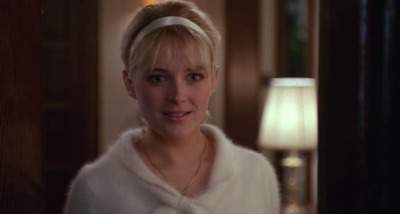
See the second commandment of screenplay format "Thou shalt not let the reader get lost" for more examples and a full explanation on how to use INT/EXT.
Structor:
I have written a whole article on "Dead Poets Society - the screenplay structure in 11 pictures".
It contains the 6 stages and 5 turning points of the story, as per Michael Hauge structure model.
From the setup to the climax and aftermath.
Dr. Read:
There is a screenwriting principle to have the characters come in a scene at the last moment and leave as soon as they can. This gives the maximum efficacity to the scene.
This principle is brilliantly illustrated in this scene:
INT. TODD'S ROOM - NIGHT Todd is sleeping. Charlie reaches across to wake him. Tears are running down his face.An amateur screenwriter would have made a long scene out of it. We would have seen Todd react, and Charlie and the other explain what happened and all would have expressed their disbelief and dispair.CHARLIE Todd? Todd. Todd, still half asleep, tries to shrug him off. TODD Oh, Charlie. Todd opens his eyes and sees Charlie's face TODD What is it? Todd looks over to see Pitts, Meeks, and Knox by the door. CHARLIE Neil's dead.
None of that here. Just "Neil's dead". And that's it.
Tom Schulman has his characters get in and out very quickly. A perfect demonstration that "less is more", which is consistent with movie dialogue rule #1.

Go from Dead Poets Society to Whatascript! Home page
* Seven, written by Andrew Kevin Walker